- Home
- William Gibson
Virtual Light Page 22
Virtual Light Read online
Page 22
‘Costa Rica?’
‘That’s right.’
‘Never have.’
‘People know how to live, there.’
‘You work for those data havens,’ Rydell said.
‘I didn’t say that. Somebody else must’ve said that.’
‘So did he,’ Rydell said. ‘He was carrying those glasses to somebody, up from Costa Rica, and she took ’em.’
‘And I was glad she did. So glad. I was in the room next to his. I let myself in through the connecting door. I introduced myself. He met Loveless. First time. Last time.’ The gun never wavered, but he began to scratch his head with his hand in the surgical glove. Scratch it like he had fleas or something.
‘Loveless?’
‘My nom. Nom de thing.’ Then a long rattle of what Rydell took to be Spanish, but he only caught nombre de something. ‘Think she’s tight, Rydell? I like it tight, myself.’
‘You American?’
His head sort of whipped sideways, a little, when Rydell said that, and his eyes unfocused for a second, but then they came back, clear as the chromed rim around the muzzle of his gun. ‘You know who started the havens, Rydell?’
‘Cartels,’ Rydell said, ‘the Colombians.’
‘That’s right. They brought the first expert systems into Central America, nineteen-eighties, to coordinate their shipping. Somebody had to go down there and install those systems. War on drugs, Rydell. Lot of Americans on either side, down there.’
‘Well,’ Rydell said, ‘now we just make our own drugs up here, don’t we?’
‘But they’ve got the havens, down there. They don’t even need that drug business. They’ve got what Switzerland used to have. They’ve got the one place in the world to keep what people can’t afford to keep anywhere else.’
‘You look a little young to have helped put that together.’
‘My father. You know your father, Rydell?’
‘Sure.’ Sort of, anyway.
‘I never did. I had to have a lot of therapy, over that.’
Sure glad it worked, Rydell thought. ‘Warbaby, he work for the havens?’
A sweat had broken out on the man’s forehead. Now he wiped it with the back of the hand that held the gun, but Rydell saw the gun click back into position like it was held by a magnet.
‘Turn on the headlights, Rydell. It’s okay. Left hand off the wheel.’
‘Why?’
‘’Cause you’re dead if you don’t.’
‘Well, why?’
‘Just do it, okay?’ Sweat running into his eyes.
Rydell took his left hand off the wheel, clicked the lights, double-clicked them to high beams. Two cones of light bit into a wall of dead shops, dead signs, dust on plastic. The one in front of the left beam said THE GAP.
‘Why’d anybody ever call a store that?’ Rydell said.
‘Trying to fuck with my head, Rydell?’
‘No,’ Rydell said, ‘it’s just a weird name. Like all those places look like gaps, now…’
‘Warbaby’s just hired help, Rydell. IntenSecure brings him in when things get too sloppy. And they do, they always do.’
They were parked in a sort of plaza, in a mall, the stores all boarded or their windows whitewashed. Either underground or else it was roofed over. ‘So she stole the glasses out of a hotel had IntenSecure security, they brought in Warbaby?’ Rydell looked at Chevette Washington. She looked like one of those chrome things on the nose of an antique car, except she was getting goosebumps down her thigh. Not exactly warm in here, which made Rydell think it might be underground after all.
‘Know what, Rydell?’
‘What?’
‘You don’t know shit about shit. As much as I tell you, you’ll never understand the situation. It’s just too big for someone like you to understand. You don’t know how to think in those terms. IntenSecure belongs to the company that owns the information in those glasses.’
‘Singapore,’ Rydell said. ‘Singapore own DatAmerica, too?’
‘You can’t prove it, Rydell. Neither could Congress.’
‘Look at those rats over there…’
‘Fucking with my head…’
Rydell watched the last of the three rats vanish into the place that had been called The Gap. In through a loose vent or something. A gap. ‘Nope. Saw ’em.’
‘Has it occurred to you that you wouldn’t be here right now if Lucius fucking Warbaby hadn’t taken up rollerblading last month?’
‘How’s that?’
‘He wrecked his knee. Warbaby wrecks his knee, can’t drive, you wind up here. Think about it. What does that tell you about late-stage capitalism?’
‘Tell me about what?’
‘Don’t they teach you anything in that police academy?’
‘Sure,’ Rydell said, ‘lots of stuff.’ Thinking: how to talk to crazy fuckers when you’re being held hostage, except he was having a hard time remembering what they’d said. Keep ’em talking and don’t argue too much, something like that. ‘How come the stuff in those glasses has everybody’s tail in a twist, anyway?’
‘They’re going to rebuild San Francisco. From the ground up, basically. Like they’re doing to Tokyo. They’ll start by layering a grid of seventeen complexes into the existing infrastructure. Eighty-story office/residential, retail/residence in the base. Completely self-sufficient. Variable-pitch parabolic reflectors, steam-generators. New buildings, man; they’ll eat their own sewage.’
‘Who’ll eat sewage?’
‘The buildings. They’re going to grow them, Rydell. Like they’re doing now in Tokyo. Like the maglev tunnel.’
‘Sunflower,’ Chevette Washington said, then looked like she regretted it.
‘Somebody’s been look-ing…’ Gold teeth flashing.
‘Uh, hey…’ Go for that talking-to-the-armed-insane mode.
‘Yes?’
‘So what’s the problem? They wanna do that, let ’em.’
‘The problem,’ this Loveless said, starting to unbutton his shirt, ‘is that a city like San Francisco has about as much sense of where it wants to go, of where it should go, as you do. Which is to say, very little. There are people, millions of them, who would object to the fact that this sort of plan even exists. Then there’s the business of real estate…’
‘Real estate?’
‘Know the three most important considerations in any purchase of real estate, Rydell?’ Loveless’s chest, hairless and artificially pigmented, was gleaming with sweat.
‘Three?’
‘Location,’ Loveless said, ‘location, and location.’
‘I don’t get it.’
‘You never will. But the people who know where to buy, the people who’ve seen where the footprints of the towers fall, they will, Rydell. They’ll get it all.’
Rydell thought about it. ‘You looked, huh?’
Loveless nodded. ‘In Mexico City. He left them in his room. He was never, ever supposed to do that.’
‘But you weren’t supposed to look either?’ It just slipped out.
Loveless’s skin was running with sweat now, in spite of the cool. It was like his whole lymbic system or whatever had just let loose. Kept blinking and wiping it back from his eyes. ‘I’ve done my job. Did my job. Jobs. Years. My father, too. You haven’t seen how they live, down there. The compounds. People up here have no idea what money can do, Rydell. They don’t know what real money is. They live like gods, in the compounds. Some of them are over a hundred years old, Rydell…’ There were flecks of white stuff at the corners of Loveless’ smile, and Rydell was back in Turvey’s girlfriend’s apartment, looking into Turvey’s eyes, and it just clicked, what she’d done.
Dumped that whole bag of dancer into the Coke she’d brought him. She hadn’t been able to pour it all in, so she’d sloshed the Coke out onto the top of the can to wash it down, mix it around.
He had his shirt undone all the way now, the dark fabric darker with sweat, and his face was turning red.
‘Loveless—’ Rydell started, no idea what he was about to say, but Loveless screamed then, a high thin inhuman sound like a rabbit with its leg caught in a wire, and started pounding the butt of his pistol into the tight crotch of his jeans like there was something terrible fastened on him there, something he had to kill. Each time the gun came down, it fired, blowing holes in the carpeted floorboard the size of five-dollar pieces.
Chevette Washington came off that console like she was on rubber bands, right over the top of the center bucket and into the cabin in back.
Loveless froze, quivering, like every atom in him had locked down all at once, spinning in some tight emergency orbit. Then he smiled, like maybe he’d killed the thing that was after his crotch, screamed again, and started firing out through the windshield. All Rydell could remember was some instructor telling them that an overdose of dancer made too much PCP look like putting aspirin in a Coke. In a Coke.
And Chevette Washington, she was going just about that crazy herself, by the sound of it, trying to beat her way out the back of the RV.
‘Hundred years old, those fuckers,’ Loveless said, and sort of sobbed, ejecting the empty magazine and snapping a fresh one in, ‘and they’re still getting it…’
‘Out there,’ Rydell said. ‘By The Gap—’
‘Who?’
‘Svobodov,’ Rydell said, guessing that might do it.
The bullets came out of the little gun like the rubber cubes out of a chunker. By the third one, Rydell had reached over, deactivated the door-lock, and just sort of fallen out. Landed on his back on some cans and what felt like foam cups. Rolled. Kept rolling ’til he hit something.
Those little bullets blowing big holes in the whitewashed glass of the dead stores. A whole section fell away with a crash.
He could hear Chevette Washington pounding on the back door of the RV and he wished he could get her to stop.
‘Hey! Loveless!’
The shooting stopped.
‘Svobodov’s down, man!’
Chevette still pounding. Jesus.
‘He needs an ambulance!’
On his hands and knees, up against some low tiled fountain smelled of chlorine and dust, he saw Loveless scramble down from the driver’s side, his face and chest slick and shining. The man had been trained so deeply, it occurred to Rydell, that it even cut through whatever the dancer was doing to him. Because he still moved the way they taught you to move in FATSS, the pistol out in both hands, the half-crouch, the smooth swings through potential arcs of fire.
And Chevette, she was still trying to kick her way out through the hexcel or whatever the back of the RV was made of. Then Loveless put a couple of bullets into it and she all of a sudden stopped.
30 Carnival of souls
At four o’clock Yamazaki descended the rungs he’d climbed with Loveless, in the dark, the night before.
Fontaine had gone, twenty minutes before the power returned, taking with him, against Skinner’s protests, an enormous bundle of washing. Skinner had spent the day sorting and re-sorting the contents of the green toolkit, the one he’d overturned in his bid for the bolt-cutters.
Yamazaki had watched the old man’s hands as they touched each tool in turn, imagining he saw some momentary strength or purpose flow into them there, or perhaps only memories of tasks undertaken, abandoned, completed. ‘You can always sell tools,’ Skinner had mused, perhaps to Yamazaki, perhaps to himself. ‘Somebody’ll always buy ’em. But then you always need ’em again, exactly the one you sold.’ Yamazaki didn’t know the English words for most of the tools there, and many were completely unfamiliar. ‘T-reamer,’ Skinner said, holding up his fist, a rust-brown, machined spike of steel protruding menacingly between his second and third fingers. ‘Now that’s about as handy a thing as you can have, Scooter, but most people never seen one.’
‘Its purpose, Skinner-san?’
‘Makes a round hole bigger. Keeps it round, too, you use it right. Sheet-metal, mostly, but it’ll do plastic, synthetics. Anything thin, fairly rigid. Short of glass.’
‘You have many tools, Skinner-san.’
‘Never learned how to really use ’em, though.’
‘But you built this room?’
‘You ever watch a real carpenter work, Scooter?’
‘Once, yes,’ Yamazaki said, remembering a demonstration at a festival, the black blades flying, the smell of cut cedar. He remembered the look of the lumber, creamy and flawless. A tea-house was being erected, to stand for the duration of the festival. ‘Wood is very scarce in Tokyo, Skinner-san. You would not see it thrown away, not even small scraps.’
‘Not that easy to come by here,’ Skinner said, rubbing the ball of his thumb with the edge of a chisel. Did he mean in America, San Francisco, on the bridge? ‘We used to burn our scrap, before we got the power in. City didn’t like that at all. Bad for the air, Scooter. Don’t do that as much, now.’
‘This is by consensus?’
‘Just common sense…’ Skinner put the chisel into a greasy canvas case and tucked it carefully away in the green box.
A procession was making its way toward San Francisco, along the upper deck, and Yamazaki instantly regretted having left his notebook in Skinner’s room. This was the first evidence he had seen here of public ritual.
In the narrow, enclosed space, it was impossible to view the procession as anything other than a succession of participants, in their ones and twos, but it was a procession nonetheless, and clearly funereal, perhaps memorial, in its purpose. First came children, seven by his hasty count, one behind the other, in ragged, ash-dusted clothing. Each child wore a mask of painted plaster, clearly intended to represent Shapely. But there was nothing funereal in their progress; several were skipping, delighted with the attention they were receiving.
Yamazaki, on his way to purchase hot soup, had halted between a bookseller’s wagon and a stall hung with caged birds. He felt awkward there, very much out of place, with the unaccustomed shape of the insulated canister under his arm. If this was a funeral, perhaps there was some required gesture, some attitude he might be expected to assume? He glanced at the bookseller, a tall woman in a greasy sheepskin vest, her gray hair bound back into a knot transfixed by two pink plastic chopsticks.
Her stock, which consisted primarily of yellowing paperbacks in various stages of disintegration, each in a clear plastic bag, was stacked before her on her wagon. She had been crying her wares, when she saw the children masked as Shapely; she’d been calling out strange phrases that he supposed were titles: ‘Valley of the dolls, blood meridian, chainsaw savvy…’Yamazaki, struck by the queer American poetry, had been on the verge of asking after Chainsaw Savvy. Then she’d fallen silent, and he too had seen the children.
But there was nothing in her manner now that indicated the procession required anything more of her than whatever degree of her attention she might choose to afford it. She was automatically counting her stock, he saw, as she watched the children pass, her hands moving over the bagged books.
The keeper of the bird stall, a pale man with a carefully groomed black mustache, was scratching his stomach, his expression mild and blank.
After the children came five dancers in the skeleton-suits of La Noche de Muerte, though Yamazaki saw that several of the masks were only half-masks, micropore respirators molded to resemble the grinning jaws of skulls. These were teenagers, evidently, and shaking to some inner music of plague and chaos. There was a strong erotic undercurrent, a violence, to the black, bone-painted thighs, the white cartoon pelvises daubed on narrow denimed buttocks. As the bone-dancers passed, one fixed Yamazaki with a sharp stare, blue adolescent eyes above the black, molded nostrils of the white respirator.
Then two tall figures, black men in an ugly beige face-paint, costumed as surgeons, in pale green gowns and long gloves of scarlet latex. Were they the doctors, predominantly white, who had failed to rescue so many, prior to Shapely’s advent, or did they somehow represent the Bra
zilian biomedical firms who had so successfully and lucratively overseen Shapely’s transformation, the illiterate prostitute become the splendid source? And after them, the first of the bodies, wrapped and bound in layers of milky plastic, each one riding a two-wheeled cart of the kind manufactured here to transport baggage or bulk foodstuffs. The carts, temporarily equipped with narrow pallets of plywood, were steered along, front and back, by men and women of no special costume or demeanor, though Yamazaki noted that they looked neither to the right nor left, and seemed to make no eye-contact with the onlookers.
‘There’s Nigel,’ the bookseller said, ‘and probably built the cart they’re taking him off on.’
‘These are the victims of the storm?’ Yamazaki ventured.
‘Not Nigel,’ the woman said, narrowing her eyes as she saw that he was a stranger. ‘Not with those holes in him…’
Seven in all, each to its cart, and then a man and a woman, in identical paper coveralls, carrying between them a laminated lithograph of Shapely, one of those saccharine portraits, large of eye and hollow of cheek, that invariably left Yamazaki feeling slightly queasy.
But then a small, red, capering figure. A tailless, hornless devil, perhaps, dancing with an enormous gun, an ancient AK-47, its bolt long gone, the curved magazine carved from wood, and all of it dipped, once, into red enamel, worn now by hands, by processions.
And Yamazaki knew, without asking, that the red dancer represented the way of Shapely’s going, like some terrible base stupidity waiting at the core of things.
‘Skinner-san?’ The notebook ready. ‘I saw a procession today. Bodies being taken from the bridge. The dead from the storm.’
‘Can’t keep ’em out here. Can’t throw ’em in the water. City sticks on that. We pass ’em over for cremation. Some people, they don’t hold with fire, they bury ’em over on Treasure. Kind of people live out on Treasure, you kind of wonder if that makes much sense.’
‘In the procession there were many references to Shapely, to his story.’
Skinner nodded over his little television.

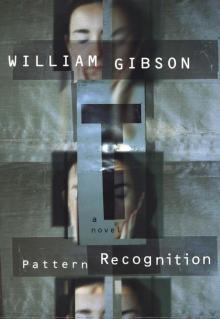 Pattern Recognition
Pattern Recognition Spook Country
Spook Country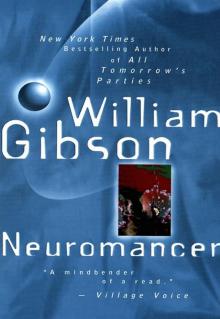 Neuromancer
Neuromancer Skinner's Room
Skinner's Room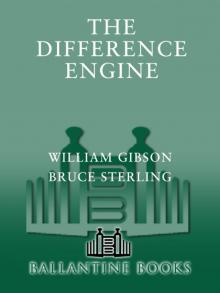 The Difference Engine
The Difference Engine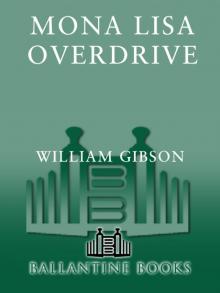 Mona Lisa Overdrive
Mona Lisa Overdrive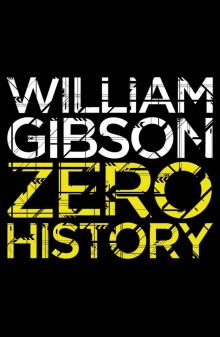 Zero History
Zero History The Peripheral
The Peripheral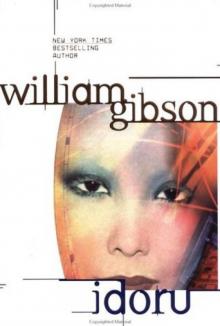 Idoru
Idoru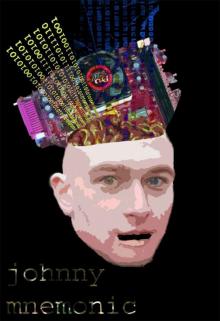 Johnny Mnemonic
Johnny Mnemonic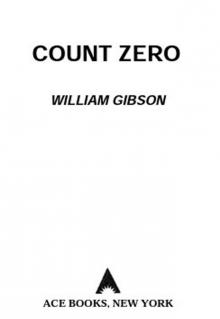 Count Zero
Count Zero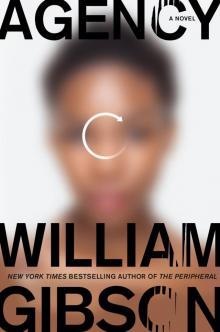 Agency
Agency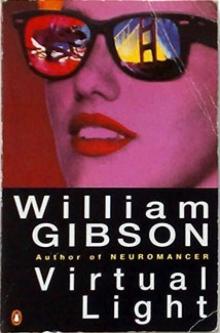 Virtual Light
Virtual Light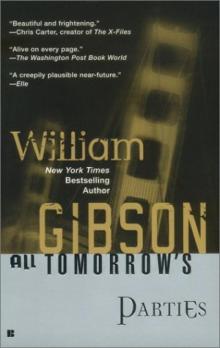 All Tomorrow's Parties
All Tomorrow's Parties The Miracle Worker
The Miracle Worker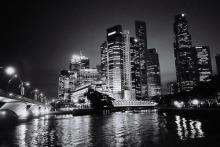 Disneyland with the Death Penalty
Disneyland with the Death Penalty Idoru tb-2
Idoru tb-2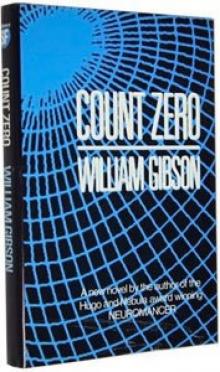 Count Zero s-2
Count Zero s-2 The Gernsback Continuum
The Gernsback Continuum New Rose hotel (tales)
New Rose hotel (tales)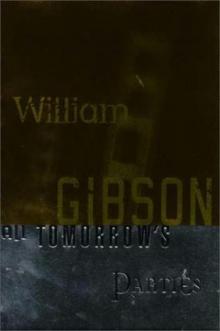 All Tomorrow's Parties bt-3
All Tomorrow's Parties bt-3 Hinterlands
Hinterlands Thirteen Views Of A Cardboard City
Thirteen Views Of A Cardboard City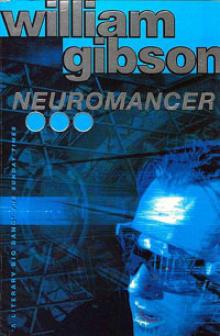 Neuromancer ts-1
Neuromancer ts-1 Virtual light b-1
Virtual light b-1